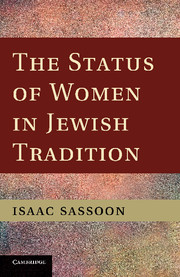Book contents
- Frontmatter
- Contents
- Preface
- Acknowledgements
- Glossary
- Abbreviations
- PART I MONOGAMY
- 1 The Sources
- 2 Pro-CD Arguments
- 3 Anti-CD Arguments
- 4 Indeterminate Arguments
- 5 Make-or-Break Argument
- 6 Which Way Does the Evidence Point?
- 7 Gen 1:27–29 Revisited
- PART II COMMANDMENTS (MIṢVOT)
- PART III INTRINSIC EQUALITY
- Conclusion
- Bibliography
- Index of Authors (Medieval & Pre-modern)
- Index of Citations from Rabbinic Literature
- Index of Names (Hebrew Bible)
- Index of Names (Talmudic)
- General Index
5 - Make-or-Break Argument
Published online by Cambridge University Press: 01 June 2011
- Frontmatter
- Contents
- Preface
- Acknowledgements
- Glossary
- Abbreviations
- PART I MONOGAMY
- 1 The Sources
- 2 Pro-CD Arguments
- 3 Anti-CD Arguments
- 4 Indeterminate Arguments
- 5 Make-or-Break Argument
- 6 Which Way Does the Evidence Point?
- 7 Gen 1:27–29 Revisited
- PART II COMMANDMENTS (MIṢVOT)
- PART III INTRINSIC EQUALITY
- Conclusion
- Bibliography
- Index of Authors (Medieval & Pre-modern)
- Index of Citations from Rabbinic Literature
- Index of Names (Hebrew Bible)
- Index of Names (Talmudic)
- General Index
Summary
A little way back, we considered the be-ḥayyehah anomaly and its awkwardness for CD's opponents. CD eludes this particular awkwardness but, in its lieu, has to face a be-ḥayyehah ordeal of its own. That make-or-break ordeal is divorce. How so? The be-ḥayyehah stipulation (orbe-ḥayyehem as paraphrased by CD) would prohibit a man from remarrying as long as his ex-wife is alive. Such a prohibition is tantamount to an abrogation of Torah divorce inasmuch as that institution severs the matrimonial knot, allowing the former partners to go their separate ways and form new alliances (Dt 24:1–4). To be sure, CD rejects levirate-marriage which is also a Pentateuchal ordinance. But, as we saw, for that rejection it found an ally in the Priestly Torah. Divorce, on the other hand, is alluded to uncensoriously in that very Priestly Torah no fewer than four times (strictly speaking, divorcees, not divorce per se: Lev 21:7,14; 22:13; Num 30:10). Even P's ban on priests marrying divorcees (Lev 21) hardly countermands the institution. In fact, limiting the ban to priests alone leaves the impression that remarriage after divorce is not intrinsically wrong. These uncritical references have disposed some scholars to doubt that any Jewish group, let alone P itself, would oppugn divorce. Accordingly, those scholars fight shy of CD's understanding of be-ḥayyehah, insofar as that understanding seems to void divorce – at least prima facie.
- Type
- Chapter
- Information
- The Status of Women in Jewish Tradition , pp. 24 - 30Publisher: Cambridge University PressPrint publication year: 2011



